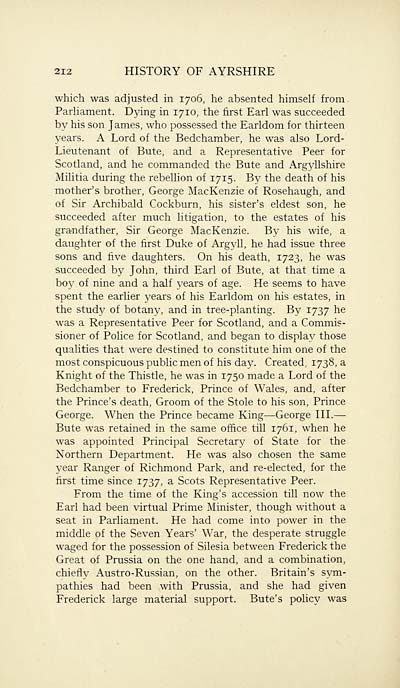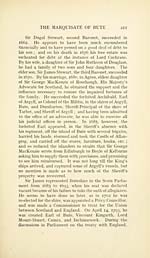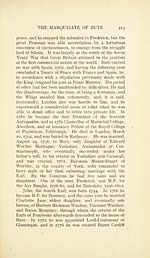Download files
Complete book:
Individual page:
Thumbnail gallery: Grid view | List view

212 HISTORY OF AYRSHIRE
which was adjusted in 1706, he absented himself from.
Parliament. Dying in 1710, the first Earl was succeeded
by his son James, who possessed the Earldom for thirteen
years. A Lord of the Bedchamber, he was also Lord-
Lieutenant of Bute, and a Representative Peer for
Scotland, and he commanded the Bute and Argyllshire
Militia during the rebellion of 1715. By the death of his
mother's brother, George MacKenzie of Rosehaugh, and
of Sir Archibald Cockburn, his sister's eldest son, he
succeeded after much litigation, to the estates of his
grandfather, Sir George MacKenzie. By his wife, a
daughter of the first Duke of Argyll, he had issue three
sons and five daughters. On his death, 1723, he was
succeeded by John, third Earl of Bute, at that time a
boy of nine and a half years of age. He seems to have
spent the earlier years of his Earldom on his estates, in
the study of botany, and in tree-planting. By 1737 he
was a Representative Peer for Scotland, and a Commis-
sioner of Police for Scotland, and began to display those
qualities that were destined to constitute him one of the
most conspicuous public men of his day. Created, 1738, a
Knight of the Thistle, he was in 1750 made a Lord of the
Bedchamber to Frederick, Prince of Wales, and, after
the Prince's death, Groom of the Stole to his son, Prince
George. When the Prince became King — George III. —
Bute was retained in the same office till 1761, when he
was appointed Principal Secretary of State for the
Northern Department. He was also chosen the same
year Ranger of Richmond Park, and re-elected, for the
first time since 1737, a Scots Representative Peer.
From the time of the King's accession till now the
Earl had been virtual Prime Minister, though without a
seat in Parliament. He had come into power in the
middle of the Seven Years' War, the desperate struggle
waged for the possession of Silesia between Frederick the
Great of Prussia on the one hand, and a combination,
chiefly Austro-Russian, on the other. Britain's sym-
pathies had been with Prussia, and she had given
Frederick large material support. Bute's policy was
which was adjusted in 1706, he absented himself from.
Parliament. Dying in 1710, the first Earl was succeeded
by his son James, who possessed the Earldom for thirteen
years. A Lord of the Bedchamber, he was also Lord-
Lieutenant of Bute, and a Representative Peer for
Scotland, and he commanded the Bute and Argyllshire
Militia during the rebellion of 1715. By the death of his
mother's brother, George MacKenzie of Rosehaugh, and
of Sir Archibald Cockburn, his sister's eldest son, he
succeeded after much litigation, to the estates of his
grandfather, Sir George MacKenzie. By his wife, a
daughter of the first Duke of Argyll, he had issue three
sons and five daughters. On his death, 1723, he was
succeeded by John, third Earl of Bute, at that time a
boy of nine and a half years of age. He seems to have
spent the earlier years of his Earldom on his estates, in
the study of botany, and in tree-planting. By 1737 he
was a Representative Peer for Scotland, and a Commis-
sioner of Police for Scotland, and began to display those
qualities that were destined to constitute him one of the
most conspicuous public men of his day. Created, 1738, a
Knight of the Thistle, he was in 1750 made a Lord of the
Bedchamber to Frederick, Prince of Wales, and, after
the Prince's death, Groom of the Stole to his son, Prince
George. When the Prince became King — George III. —
Bute was retained in the same office till 1761, when he
was appointed Principal Secretary of State for the
Northern Department. He was also chosen the same
year Ranger of Richmond Park, and re-elected, for the
first time since 1737, a Scots Representative Peer.
From the time of the King's accession till now the
Earl had been virtual Prime Minister, though without a
seat in Parliament. He had come into power in the
middle of the Seven Years' War, the desperate struggle
waged for the possession of Silesia between Frederick the
Great of Prussia on the one hand, and a combination,
chiefly Austro-Russian, on the other. Britain's sym-
pathies had been with Prussia, and she had given
Frederick large material support. Bute's policy was
Set display mode to:
![]() Universal Viewer |
Universal Viewer | ![]() Mirador |
Large image | Transcription
Mirador |
Large image | Transcription
Images and transcriptions on this page, including medium image downloads, may be used under the Creative Commons Attribution 4.0 International Licence unless otherwise stated. ![]()
| Histories of Scottish families > Ayrshire > Volume 2 > (222) Page 212 |
|---|
| Permanent URL | https://digital.nls.uk/95191762 |
|---|
| Attribution and copyright: |
|
|---|---|
| Description | A selection of almost 400 printed items relating to the history of Scottish families, mostly dating from the 19th and early 20th centuries. Includes memoirs, genealogies and clan histories, with a few produced by emigrant families. The earliest family history goes back to AD 916. |
|---|

